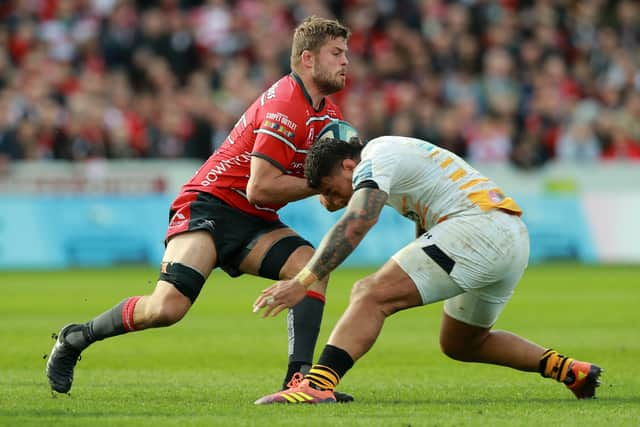Ed Slater: who is rugby player diagnosed with motor neurone disease - link between the sport and MND
and live on Freeview channel 276
The sporting world has flocked to show their support for English Premiership rugby union star Ed Slater after it was announced that he had been diagnosed with motor neurone disease (MND).
The 33-year-old has retired from professional rugby with immediate effect and the Scarlets, Leinster, Saracens, Harlequins, Munster and Ulster are just some of the clubs that have since sent their messages of support to Slater.
Advertisement
Hide AdAdvertisement
Hide AdHis current club, Gloucester, revealed the news in a statement yesterday afternoon.
The statement read: “Gloucester Rugby is deeply pained to announce that Ed Slater has been diagnosed with Motor Neurone Disease (MND).
“Following six months of testing, Ed’s diagnosis was confirmed last week and as a result, with the support of his family, friends and Gloucester Rugby, he has made the difficult decision to retire from professional rugby with immediate effect.
“Everyone at Gloucester Rugby - players, management and staff - are entirely committed to supporting Ed, his wife Jo and his three children in whatever way required. We know the same will be true of Gloucester and Leicester fans, and the wider rugby community.
Advertisement
Hide AdAdvertisement
Hide Ad“While Ed, his family and the Club take time to determine next steps, Gloucester Rugby have opened a JustGiving page. The direction of these funds will be determined in due course, whether it be supporting Ed and his family directly and/or a selected MND charity.”


Who is Ed Slater?
Ed Slater was born in Leicester in 1988 and went on to begin his rugby career with Milton Keynes RUFC before moving to Australia.
He joined Eastern Suburbs RUFC in New South Wales at 19-years-old and began to really improve in Australia before returning to his home country with Nottingham.
Slater’s impressive performances in the Championship playoffs earned him a move back to Leicester with the Tigers in 2010.
Advertisement
Hide AdAdvertisement
Hide AdSlater developed into a brilliant player in his hometown, helping Tigers to the Aviva Premiership final in 2011 and claiming a Premiership winner’s medal for the 2012/13 season. He then went onto captain the side between 2014 and 2016.
He then joined Gloucester in 2017 where he made 90 appearances before he was forced to retire.
Slater also played four times for England Saxons.
What is the link between rugby and MND?
Slater’s announcement comes five years after Scottish Rugby legend Doddie Weir revealed he was suffering from MND, while former Leeds Rhinos star Rob Burrow was diagnosed with the same disease in 2019.
Slater’s news has led to calls for the rugby authorities to commission urgent research into a possible link between rugby and MND due to the increasing number of players diagnosed with the disease.
Advertisement
Hide AdAdvertisement
Hide AdStudies in football have previously shown that former players are between four and six times more likely to suffer with MND than the wider population, while a 2019 review in the Global Spine Journal suggested that it was associated with “professional sports and sports prone to repetitive concussive head and cervical spinal trauma”.
However, research is yet to be examined directly into MND in the context of rugby.
My Name’5 Doddie Foundation
My Name’5 Doddie Foundation was set up by Doddie Weir following his diagnosis and has been driven to help sufferers and seek ways to further research into the incurable disease.
The foundation has already raised millions for more MND research, however following Slater’s announcement they have shared their further concerns.
Advertisement
Hide AdAdvertisement
Hide AdA statement by the foundation read: “My Name’5 Doddie Foundation also recognises the increased attention surrounding potential links between head injury and neurological disease, but there is currently not enough definitive research on which to draw conclusions about potential links with motor neurone disease.
“Whilst the evidence around a link between head trauma and dementia seems to be gaining momentum, the same cannot be implied for MND; these diseases have different causes and underlying factors.
“MND is a complex disease and, although we now have a much greater understanding of the genetics involved, the link between genes, environmental and lifestyle factors is not well understood. Further research is critical to unravelling these details.”
Comment Guidelines
National World encourages reader discussion on our stories. User feedback, insights and back-and-forth exchanges add a rich layer of context to reporting. Please review our Community Guidelines before commenting.
